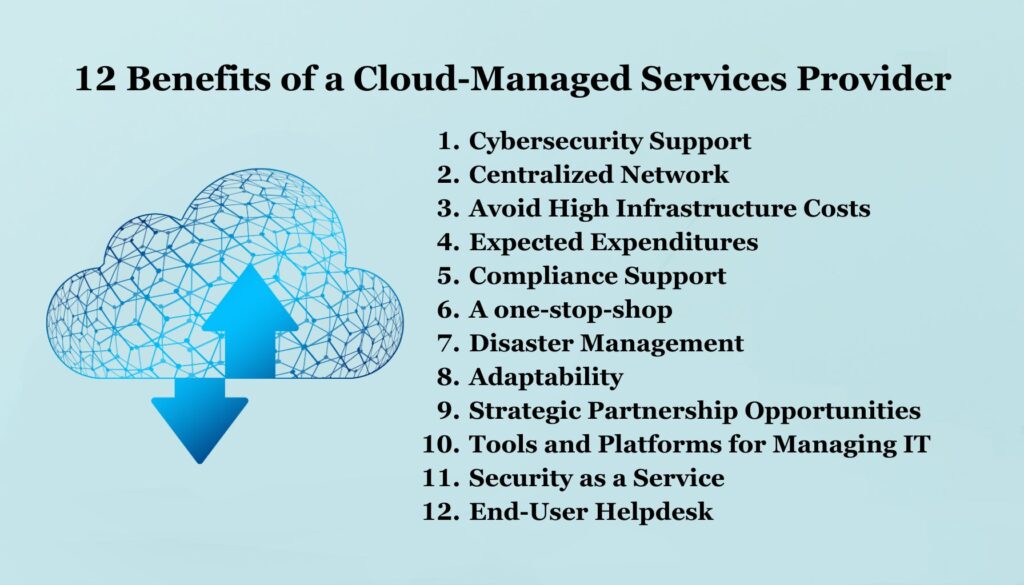Managed cloud services usually involve comprehensive or partial management of Public and Hybrid IT environments. Managed cloud service providers (MCSPs) offer different value propositions based on migration, security, configuration, and optimization factors. This article will cover 12 key benefits of working with a Cloud Managed Services Provider.

What Are Managed Cloud Services?
Managed cloud services allow businesses full or partial control over their cloud resources and infrastructure. Namely, these offerings delve into migrating data, optimizing systems, scaling for performance, and protecting and maintaining networks or websites.
These services are available for enterprises running public clouds, private clouds, or hybrid infrastructures at any point in the cloud adoption lifecycle. Typically, companies consult the managed cloud service providers (MCSPs) before migrating so they can get expert help in selecting the right cloud resources and setting them up properly from the onset.
Managed cloud infrastructure is when a service provider manages the entire cloud environment for a client. This comprises managing servers, storage, and networks, securing them using firewalls and encryption, and making performance improvements and updates. Backup, recovery, monitoring system performance, and scaling resources based on demand are other activities that the service provider performs. With this kind of setup, businesses can concentrate on their main activities as they leverage service providers who are skilled in cloud management and have managed to make it more efficient.

What are Managed Cloud Service Providers (MCSPs)?
A Managed Cloud Service Provider (MCSP) provides cloud services and manages a company’s cloud infrastructure. Usually, these providers have packages based on subscriptions, which could either replace an organization’s in-house IT or complement their existing internal teams.
5 Top Managed Cloud Service Providers
There are many managed cloud service providers, so choosing the right one is tricky. To simplify your search, we will mention six well-known providers based on independent research and professional analysts’ feedback.
1. Deloitte
Deloitte is a global company with extensive coverage in North America and Europe. It mainly focuses on customers in the finance industry, government, and healthcare. Some major multi-cloud spaces supported by Deloitte are AWS Azure, Google Cloud Platform, and VMware Cloud Oracle Cloud.
Deloitte concentrates on creating, developing, and managing cloud systems with more stress on cloud transformation. It helps clients identify where the cloud can be adopted and provides custom solutions to improve their operations. Deloitte is most suitable for large enterprises involved in digital transformations. Even though Deloitte is well-known for consulting services, its focus on managed services has been steadily growing.
2. Accenture
Accenture has a strong global presence, mainly in Europe, North America, and the Asia-Pacific (APAC). The firm supports various multi-cloud environments, with most clients leveraging Amazon Web Services (AWS), Microsoft Azure, Oracle Cloud, and Google Cloud Platform (GCP). The company also has an extensive suite of infrastructure-managed services that involve management, hosting, migration, and evolution of cloud infrastructure.
3. NTT DATA
Most of NTT Data’s managed cloud services are in North America and the Asia-Pacific (APAC), with Europe close behind. The business serves global markets with a particular focus on major manufacturing industries like healthcare and finance/insurance.
Most of NTT Data’s managed services clients use Amazon Web Services (AWS), while the rest go for Microsoft Azure, Google Cloud Platform (GCP), and IBM Cloud. The firm specializes in application modernization and cloud migration that helps customers transition from outdated architectures into corporate-grade cloud technologies.
4. TCS
TCS, Tata Consultancy Services, is an international company that gives much attention to the United States and Europe. The main sectors TCS deals with are life sciences/biotech/pharmaceuticals, retail, and financial services/insurance. TCS provides support services for different multi-cloud environments; their customers who use managed services are distributed evenly among Azure, Oracle Cloud, and AWS, while some others use Google Cloud Platform (GCP) or IBM Cloud.
TCS has three dedicated business units, AWS, Azure, and GCP, that are specialized to provide support in each case. The supplier is known for assisting customers in creating cloud migration blueprints that are in sync with their business strategies. TCS’s managed services solution transforms existing workflows and applications into cloud-native alternatives.
5. HCL Technologies
HCL Technologies operates on a global scale, with key areas of business being North America and Europe. The company serves various industries, such as general manufacturing, financial services/insurance, and life sciences/biotech/pharmaceuticals.
While it supports multi-cloud environments, Microsoft Azure is used by around 90% of the clients for which HCL handles managed services. The rest of the users rely on other popular cloud platforms like AWS, Google Cloud Platform, Oracle Cloud, IBM Cloud, and Alibaba Cloud.
HCL uses a cloud strategy focused on developing and migrating applications to the cloud. Its cloud-native application infrastructures are optimized for cloud efficiency from existing applications and workloads. This helps companies effectively design their applications, which are developed and managed within the cloud space. Get to know more about the difference between a cloud app and a web app.
Advantages and Disadvantages of Cloud-Managed Service Providers
When considering hiring a managed service provider to help you manage your cloud needs, it is critical to consider the benefits and potential drawbacks. While these issues do not always determine your choice, understanding them will help you get the most out of using any particular company and minimize any possible challenges that may arise while working with them.
According to statistics by MarketsandMarkets, the global managed services market will increase from $275.5 billion in 2023 to $372.6 billion by 2028 at a Compound Annual Growth Rate (CAGR) of 6.2% during the period under analysis.
Providers of cloud-managed services mainly handle delegated responsibilities like cloud maintenance and support. Many firms find it difficult to use their internal teams to manage the cloud if they have migrated their applications online or developed them for public access. Such challenges can be due to a lack of staff within the company who are experts enough to effectively monitor and modify resources or configurations in the cloud infrastructure without causing any damage because they did not specialize in this area during coursework or at their previous employment levels.
12 Key Benefits of Utilizing a Cloud-Managed Services Provider
A cloud-managed solutions provider can profoundly influence the production activities of any business. The services present several important benefits, ranging from making it easy to increase resource allocation anytime to highly advanced ways to protect data through reputable security systems.

1. Cybersecurity Support
Currently, many cybercriminals are targeting small companies with significant threats to data security. However, companies can obtain full Cybersecurity support by collaborating with a cloud-managed services provider. Instead of dealing with cyberattacks, they can concentrate more on their main activities.
Leading cloud platforms that include high-end cyber security solutions are Amazon Web Services [AWS], Microsoft Azure, and Google Cloud, amongst others. Such first-rate providers use cutting-edge security measures to protect against new kinds of cyber threats, ensuring your cloud server assets are safe from any danger. Eager to learn why cloud application security is a must and how to maintain it? We’ve already written a detailed article on this topic.
2. Centralized Network
The move to the cloud allows storage and backup to be integrated into a centralized network where all applications and servers are controlled from one central data center. This implies that any remote users can access centralized data on the same network and even virtual services. Consequently, the network’s increased availability leads to enhanced business operations.
3. Avoid High Infrastructure Costs
By utilizing Managed cloud service providers, organizations can enjoy continuous management of their cloud infrastructure 24/7. These providers ensure reliable, robust solutions that operate at peak performance, nullifying the need to choose between platforms such as AWS or Azure and manage intricate handovers.
MCSPs take on the responsibility of configuring your network and taking care of all cloud migration plans. They also do hardware asset management and staff training. In this way, you do not have to worry about anything concerning infrastructure since they handle it; this enhances confidence in data reliability and security, meaning cloud solutions are well managed while core business operations are enhanced.
4. Expected Expenditures
The overseeing of cloud-managed services can lead to cutting down on day-to-day expenses. For instance, only used data is paid for monthly, and you can choose the necessary support level according to demand. Consequently, this ensures a uniform monthly invoice, helping anticipate spending limits. Cloud service providers will always come to your rescue with an individualized program, even if your needs change occasionally.
5. Compliance Support
Organizations often struggle with observing strict safety policies — a situation only made worse by rigorous industrial laws and regulations. Regardless of the industry, whether it be healthcare or online retail, not adhering to privacy norms can have serious repercussions. Managed service providers (MSPs) have knowledge of industry-specific regulations and can help businesses navigate complex compliance requirements.
6. A one-stop-shop
If you are to handle moving into the cloud on your own, it would mean working with different firms. This will result in unnecessary cost overruns and chaos. However, cloud-managed service providers provide many options, including all services that are available in one place. In such a situation, you will only have one supplier and one bill, making things easier for you.
7. Disaster Management
Data is protected and secure across all cloud services and applications due to the use of managed cloud services. Compared to on-premise computing, the latter ensures that an organization can continue operating with minimal downtime if disaster strikes. At a virtual level, there is an automatic restriction of resource balancing and failover between hardware hosts. Another possibility is that the hardware and software can be sustained and improved upon.
Companies using on-premise hosting must spend a lot of money on maintenance and security to keep their servers in good condition. In the case of cloud-managed services, the service provider oversees all the ongoing updates, thus allowing organizations to save their financial resources.
8. Adaptability
Any expanding business can easily rely on cloud-managed services irrespective of the level of advancement. These services can grow to the level that they want.
9. Strategic Partnership Opportunities
Cloud Managed Services enable strategic partnerships to foster business growth and innovation. Working with experienced companies can create synergistic relations where organizations gain resources, professional knowledge, and industry insights.
10. Tools and Platforms for Managing IT
Manage Service Providers (MSPs) have deep expertise in the most recent and most effective IT management tools and platforms because they mainly manage IT Systems. They quickly pinpoint operational hitches through this knowledge and apply industry standards to manage risks so that you get the most out of your information technology investments.
11. Security as a Service
In light of the growing complexity of cybersecurity threats, managed services offer Security as a Service, enhancing the quality of information technology and user protection. It also encompasses disaster recovery and business continuity planning to ensure continuity in case of an unplanned event, thus making it possible for organizations to recover quickly with fewer interruptions until normalcy resumes.
12. End-User Helpdesk
Service Desks are essential for any Managed Services since they help improve user experience and satisfaction by ensuring that incidents are well-managed and trackable. An MSP empowers you to answer questions or address issues promptly through the latest knowledge base and provides improved flexibility.
Key Considerations for Selecting a Managed Cloud Service Provider
When you are new to cloud services, selecting the right MCSP can be daunting. Numerous providers offer the same services. Therefore, you should focus on the main aspects that align with your firm.
Evaluate the following when considering MCSP possibilities:
Service provision: Make sure that they match what you need in terms of range and standard.
Knowledgeability and expertise: Seek out firms that have been around in your area of operation for a while.
Safety precautions: Check all providers’ security measures and compliance-related knowledge.
Value for money and cost: Compare plan prices between companies and weigh their prices with their reputation and experience to find the company that offers the best value for quality service.
Responsive customer assistance: To ensure your demands can always be met, ensure the MSP has a reliable communication system that responds promptly whenever needed.
Managed Service Provider vs. Cloud Services Provider
Managed Service Provider (MSP):
Scope of Services: MSPs provide extensive IT support services, comprising network management, cybersecurity, data backup, and helpdesk support.
Management Model: An MSP manages a client’s entire IT infrastructure and usually provides ongoing maintenance and support.
Client Focus: They work with businesses to ensure the smooth operation of IT systems, including handling of on-premises and cloud-based services.
Billing: They frequently utilize subscription or managed services contract models with predictable monthly costs.
Service Customization: These companies offer customized solutions based on specific business requirements and can utilize multiple technologies.
Cloud Service Provider (CSP):
Scope of Services: The core activity of a CSP is to provide virtual servers, storage, databases, or applications in a cloud where servers can elastically scale up or down depending on demand.
Manageability Model: CSPs offer customers scalable cloud resources that those customers access directly or through other tools.
Client Focus: CSPs act as a conduit for accessing cloud resources, with features like self-service or scalability options.
Billing: CSPs use a pay-as-you-go model that charges according to consumption depending on the resources used.
Service Customization: A variety of customized cloud options are available, though the focus is on cloud infrastructure plus applications.
How Can LITSLINK’s Cloud Solutions Revolutionize Your IT Infrastructure?
LITSLINK offers expert-guided and contemporary technology solutions to boost the performance of your business.
How we can help you:
Customized and Tailored Cloud Solutions: Tailored cloud-managed services enhance IT infrastructure. If you need cloud migration, we manage it or optimize it. Your system will be secure, scalable, and efficient under our management.
Consult with the IT Experts: Consult with seasoned IT professionals; they will provide strategic guidance to align technology with business objectives. We assist in making informed decisions that drive growth from IT strategy development through technology roadmaps.
Scalable IT Services: Our scalable solutions grow with our clients. Flexible services are offered that can be adapted as a business’s needs change, ensuring that they always have an IT infrastructure that allows them to expand smoothly.
Wrapping Up
Partnering with a Managed Cloud Services Provider (MCSP) has several advantages, such as better protection, simpler solutions, and cost efficiency. MCSPs have the necessary skills to manage everything from moving data to improving its effectiveness. This gives business entities time to concentrate on what they know best as they exploit the full benefits of cloud computing.
Despite the many benefits, some demerits exist, such as high costs and dangers related to shared servers. By thoroughly analyzing these areas, firms can reap the advantages of cloud-managed services while avoiding the obstacles that come along with them.





